 Petzlover
Petzlover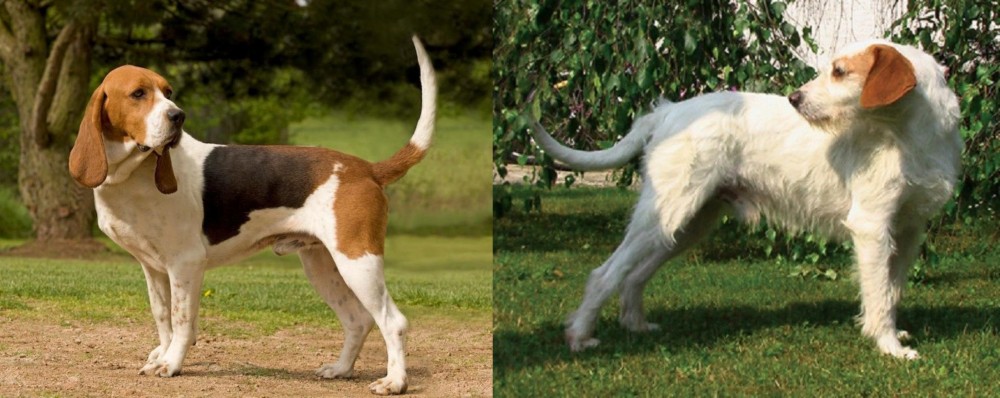 Artois Hound is originated from France but Istarski Ostrodlaki Gonic is originated from Croatia. Both Artois Hound and Istarski Ostrodlaki Gonic are having almost same height. Both Artois Hound and Istarski Ostrodlaki Gonic are having almost same weight. Artois Hound may live 3 years more than Istarski Ostrodlaki Gonic. Artois Hound may have more litter size than Istarski Ostrodlaki Gonic. Both Artois Hound and Istarski Ostrodlaki Gonic requires Low Maintenance.
Artois Hound is originated from France but Istarski Ostrodlaki Gonic is originated from Croatia. Both Artois Hound and Istarski Ostrodlaki Gonic are having almost same height. Both Artois Hound and Istarski Ostrodlaki Gonic are having almost same weight. Artois Hound may live 3 years more than Istarski Ostrodlaki Gonic. Artois Hound may have more litter size than Istarski Ostrodlaki Gonic. Both Artois Hound and Istarski Ostrodlaki Gonic requires Low Maintenance.
 The Artois Hound developed in France, essentially from the Picardy and Artois regions of northern France. The idea was to use them for the hunting of hares, fox and wild boars during the time of King Henry IV and Louis XIII. Unfortunately, with cross-breeding, the bloodline all but deteriorated and it took a couple of decades for the Artois breed to be restored.
The Artois Hound developed in France, essentially from the Picardy and Artois regions of northern France. The idea was to use them for the hunting of hares, fox and wild boars during the time of King Henry IV and Louis XIII. Unfortunately, with cross-breeding, the bloodline all but deteriorated and it took a couple of decades for the Artois breed to be restored.
After the 2nd world war, there was once again concern about the breed becoming extinct. A certain Mr.Audréchy from northern France stepped in and the breed was built up again. Today this hunting dog is essentially found in France, and a few hundred of them are registered with the Federation Cynologique Internationale (FCI), and both the FCI and the United Kennel Club (UKC) recognize the Artois Hound.
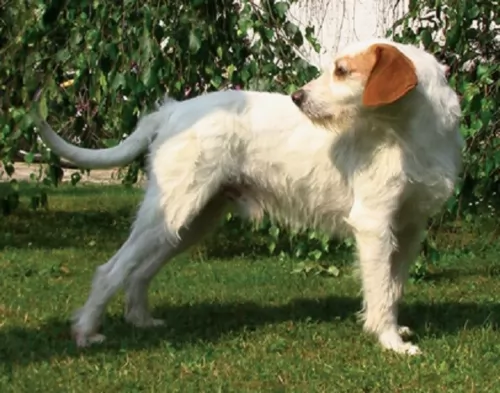 The Istarski Ostrodlaki Gonic, also referred to as the Istrian wire-haired or short-haired scenthound is a very ancient dog breed. Apparently the dog has been found in paintings that go way back to the early 1700s.
The Istarski Ostrodlaki Gonic, also referred to as the Istrian wire-haired or short-haired scenthound is a very ancient dog breed. Apparently the dog has been found in paintings that go way back to the early 1700s.
The dog can either have a short, smooth coat or a rough, wiry longer coat. He has always been popular with hunters, used for hunting rabbits and fox.
An interesting fact with this dog is the correlation between the Dalmatian dog and the Istrian short-haired hound. According to veterinary investigations, there are strong likenesses between the two breeds.
The truth is, the origin of the Istrian has been a matter of dispute for some time but in 2003 the Federation Cynologique Internationale recognized the breed as hailing from Croatia.
 Looking much like the Basset Hound and also referred to as French Artois Hound, Picard or Briquet, the muscled Artois Hound is a descendant of the Bloodhound and a rare breed.
Looking much like the Basset Hound and also referred to as French Artois Hound, Picard or Briquet, the muscled Artois Hound is a descendant of the Bloodhound and a rare breed.
The dog is well built with a large head, large eyes and large, hanging ears. He has a short coat, with the main colours being white, tan and black.
The energetic Artois Hound is a medium-to-large sized dog breed, and by FCI standard, they should be 20 inches to 22 3/4 inches tall from ground to withers.They weigh between 25 – 30kg or 55 and 65 pounds, are well muscled and strong with a short, dense coat.
These dogs are known for their endurance, making them ideal as a hunting- or walking companion. The Artois Hound is full of energy and he will require plenty of boisterous activities as well as training and socialization.
Although this is an intelligent breed, he can be stubborn. He’s a friendly character and will get on well with children, loving their energy and games. He’s amicable, and will also get on with other pets in the home too.
Artois Hounds are loyal to their human families. They’re not particularly good watchdogs though as they aren’t aggressive dogs, being social and friendly.
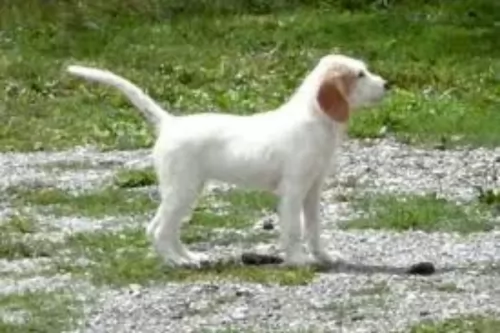 Medium in size, the Istarski Ostrodlaki Gonic stands at roughly 43 to 60cm at the withers and weighs roughly 12 to 27kg. The chest of the dog is broad and deep, the skull slightly rounded while the muzzle is strong and rectangular shaped. The nose is dark brown or black.
Medium in size, the Istarski Ostrodlaki Gonic stands at roughly 43 to 60cm at the withers and weighs roughly 12 to 27kg. The chest of the dog is broad and deep, the skull slightly rounded while the muzzle is strong and rectangular shaped. The nose is dark brown or black.
The ears are floppy and are nearly always in the orange color while the tail is long and is carried low. The coat of the rough haired dog is of medium length. In fact the coat can either be short and smooth or longish and wiry with a woolly undercoat. The color of the coat is white with orange markings.
This breed of dog is sought after for his cheerful personality. He is loyal to his human family and is a social dog, loving to spend time around his family.
He is energetic, confident and strong-willed and this is why, as with most other dogs, he will benefit from training and socialization, as this makes him obedient and responsive to his owner. He is evenly tempered, being gentle and docile.
 Your Artois is an ideal family pet when you provide him with the love and attention that any member of a family deserves. Buy your Artois from a reputable breeder so that all the excellent characteristics of this lively breed are found in your 4-legged friend.
Your Artois is an ideal family pet when you provide him with the love and attention that any member of a family deserves. Buy your Artois from a reputable breeder so that all the excellent characteristics of this lively breed are found in your 4-legged friend.
The Artois is just waiting to be your devoted companion and will promise unconditional friendship in exchange for quality food, veterinary care, exercise and attention. To make sure you never lose your pet, outfit him with a collar and ID tag so that should he become lost, the chances are far better that he’ll be found.
A dog isn’t a human and you want to always make sure that you’re reasonable with what to expect from him. Most little problems with your wonderful friend can be solved with kindness, compassion and patience.
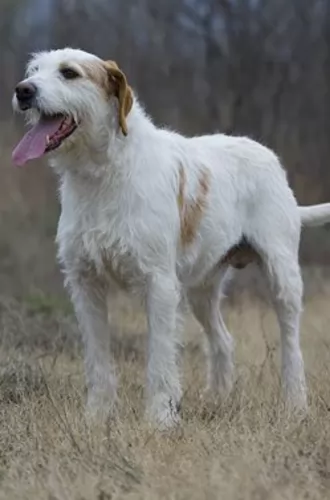 The Istrian Wire-haired Scenthound or Istarski Ostrodlaki Gonic as he is also referred to is a strong, well built hound which is elegant in appearance.
The Istrian Wire-haired Scenthound or Istarski Ostrodlaki Gonic as he is also referred to is a strong, well built hound which is elegant in appearance.
He has a remarkably striking coat - bright white with orange markings. He has always been an excellent hunting dog, even to this day. This background hunting of his will require that he receives ongoing exercise as well as mental stimulation.
Treat this beautiful dog well - exercise him, groom him, feed him well and love him and you will be rewarded with the loyal and devoted friendship of an amazing dog.
 There are no known health problems that come as specific to the Artois Hound. The health problems that do develop are common ailments that can be found in most other dog breeds too.
There are no known health problems that come as specific to the Artois Hound. The health problems that do develop are common ailments that can be found in most other dog breeds too.
Your Artois Hound will still need to visit the vet as a puppy for a thorough check-up as well as vaccinations and for any health issues he may have.
check for bad breath problems. Dental plaque can cause a nasty odour that will require dental treatment from a professional. The dog’s teeth can be maintained by brushing the teeth regularly with special canine toothpaste- and brush. However your dog’s bad breath could be indicative of other health problems such as diabetes.
Parasites, fleas, ticks and worms – there are many new treatments to manage these pests and your veterinarian will guide you towards a treatment for your pet.
if your pet is exposed to mosquitoes often, the insect carries the worm from dog to dog. Speak to your vet about treatment, more so when you live in a warm, wet area where mosquitoes thrive.
Your Artois Hound puppy will have to be vaccinated with a combo vaccine to protect him from hepatitis, distemper, leptospirosis, parvovirus and parainfluenza. They should have received their first immunizations by 8 weeks of age. Speak to your vet about rabies shots as well.
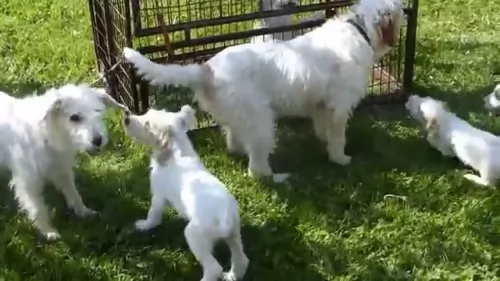 There are people who don’t take dental disease seriously in dogs as they think that it simply affects the teeth, when in fact dental disease can affect the dog’s entire body.
There are people who don’t take dental disease seriously in dogs as they think that it simply affects the teeth, when in fact dental disease can affect the dog’s entire body.
Dental- and gum disease is to be regarded with concern as it can be painful and even life threatening. It affects many dogs, and unfortunately your Istarski is also likely to have problems with his teeth. Tartar build-up and infection of the gums can lead to tooth loss but also damage to the kidneys, heart and joints.
Dogs need to have their teeth attended to regularly and if this is something new to you, speak to your vet and find out about special canine toothpaste and toothbrush and how to use them.
Dogs can be susceptible to bacterial and viral infections such as rabies, distemper and parvo, and that is why visits to your vet are so important. These life-threatening diseases for your Istarski Ostrodlaki Gonic are preventable through vaccinations.
 The beauty with the Artois Hound is that he is low-maintenance and he will only require the basic tender loving care to keep him happy and healthy.
The beauty with the Artois Hound is that he is low-maintenance and he will only require the basic tender loving care to keep him happy and healthy.
The Artois isn’t a high maintenance dog and the low-shedding, short-haired coat will required a good brush a couple of times a week to remove loose hairs. The dog only requires a bath when absolutely necessary as bathing dries out natural oils in the skin. Never use a human shampoo – only a proper dog shampoo.
Artois Hound puppies up to 12 weeks will need to be fed every 6 hours. Puppies of 6 months and older can have 2 bowls of food, and from one year of age, one bowl of food may be adequate. It’s an individual choice as 2 smaller meals a day can also suffice. Speak to your vet about premium-quality dry- and wet foods as well as about making your own dog food. You want to ensure the foods eliminate mineral and vitamin deficiencies. Ensure there is ALWAYS a bowl of fresh, cool water within your dog’s reach.
This is a hunting dog so he will need plenty of exercise. Without regular exercise, a dog like the Artois becomes frustrated and destructive. Your Artois is your 4-legged family member, and according to age and individual traits will benefit from throwing ball games, pulling on ropes and running while you cycle. The cherry on the top is that you benefit from the exercise too!
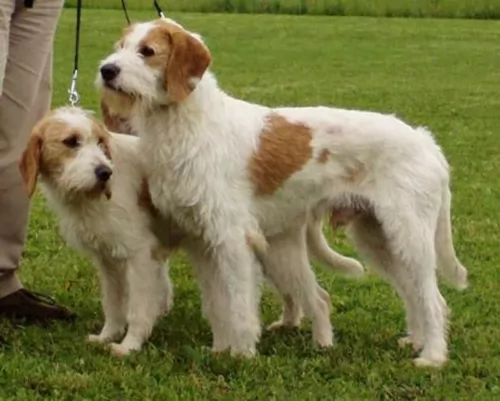 Taking care of an Istarski Ostrodlaki Gonic dog is much like caring for a child – doing everything you can to keep him healthy and happy, after all, he is a member of your family.
Taking care of an Istarski Ostrodlaki Gonic dog is much like caring for a child – doing everything you can to keep him healthy and happy, after all, he is a member of your family.
You want to be watching his diet and making sure that it is the best quality there is, full of vitamins and minerals to keep his eyes bright, his nose wet and his tail wagging.
There are excellent commercially manufactured dog foods on the market today and the best ones ensure excellent nutrition for your dog to keep him in optimal condition through each stage that he goes through. Try to include some home-made food into this kibble such as cooked chicken, brown rice and vegetables and it can be to his benefit to just to include some raw meat from time to time.
Make sure your Istarski Ostrodlaki Gonic is well exercised, that you check his teeth and ears to ensure there are no infections and to call the vet immediately you suspect something is wrong. Make sure you have him examined as a puppy and that he gets his necessary injections as there are diseases that can kill your dog.